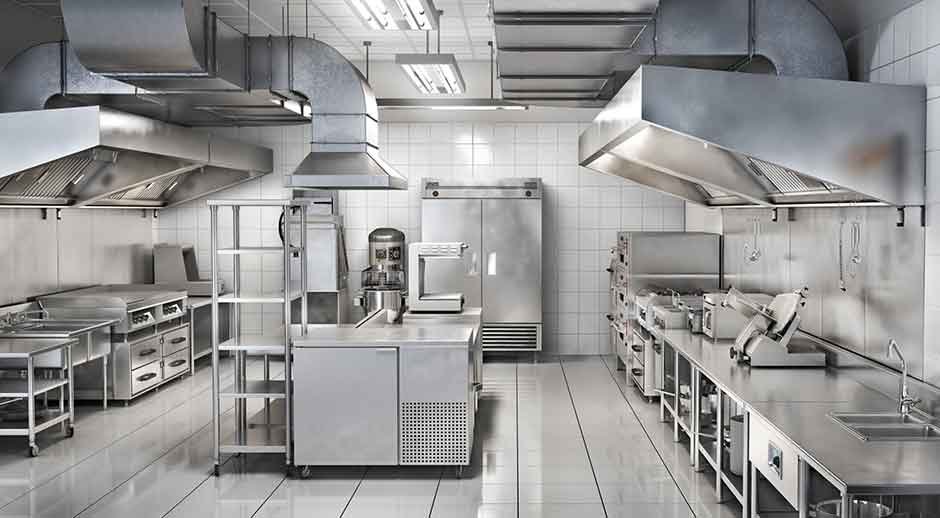Commercial kitchens are specialized facilities designed for food preparation, cooking, and service on a large scale. They are found in a variety of establishments, including restaurants, hotels, schools, hospitals, and catering companies. The unique requirements of commercial kitchens make them distinct from residential kitchens, and they require specialized equipment, layout, and management.
One of the primary differences between commercial and residential kitchens is the volume of food produced. Commercial kitchens must be capable of preparing and serving large quantities of food efficiently and consistently. They are designed to handle high traffic and demand, with large workspaces and multiple stations for food preparation, cooking, and plating.
To meet the needs of a commercial kitchen, specialized equipment is essential. Commercial-grade appliances, such as stovetops, ovens, grills, and fryers, are designed to handle heavy use and high temperatures. In addition, refrigeration and storage equipment, such as walk-in coolers and freezers, are necessary to keep food fresh and prevent spoilage.
The layout of a commercial kitchen is also critical to its success. The design must optimize workflow, minimize congestion, and ensure safety. For example, food preparation areas should be separate from cooking areas, and the kitchen should be divided into distinct workstations, such as a bakery, grill, and prep area.
Another important consideration in commercial kitchens is cleanliness and hygiene. Food safety is of utmost importance in a commercial kitchen, and proper cleaning and sanitization practices must be strictly followed. Commercial kitchens are subject to inspections by local health departments to ensure compliance with food safety regulations.
Effective management is critical for a successful commercial kitchen. Proper staffing, training, and scheduling are essential to ensure that the kitchen operates smoothly and efficiently. Additionally, inventory management, purchasing, and menu planning must be carefully coordinated to ensure that the kitchen is well-stocked and can meet demand.
In addition to the equipment, layout, and management of commercial kitchens, there are also specific regulations and codes that must be followed to ensure safety and compliance. For example, ventilation systems must meet specific requirements to ensure adequate airflow and prevent the buildup of heat, steam, and grease.
Furthermore, the design of a commercial kitchen must also consider the comfort and safety of the kitchen staff. Ergonomics play a crucial role in preventing injuries and minimizing fatigue. Workstations should be designed to minimize strain on the body, and proper lighting and flooring are essential for creating a safe and comfortable work environment.
Another consideration in commercial kitchens is energy efficiency. Energy costs can be a significant expense in a commercial kitchen, and many appliances are designed with energy-saving features to help reduce costs. Additionally, energy-efficient lighting and HVAC systems can help reduce energy usage and lower operating costs.
But beyond the technical aspects of commercial kitchens, there is also a significant impact on the environment that needs to be considered. The food service industry has been recognized as a significant contributor to environmental issues, including waste generation, water and energy consumption, and greenhouse gas emissions.
To address these environmental challenges, many commercial kitchens are adopting sustainable practices and technologies. For example, composting food waste, using energy-efficient equipment and lighting, and implementing water-saving measures can help reduce the environmental impact of commercial kitchens.
One of the most significant sources of waste in commercial kitchens is food waste. According to the Food and Agriculture Organization (FAO), one-third of all food produced globally is lost or wasted, which amounts to approximately 1.3 billion tons per year. In the United States alone, an estimated 40% of all food produced is wasted, with the food service industry contributing to a significant portion of this waste.
To reduce food waste, many commercial kitchens are implementing composting programs. Composting involves the conversion of organic waste, such as food scraps and yard waste, into a nutrient-rich soil amendment. Composting not only reduces waste but also provides a valuable resource for soil health and plant growth.
Another environmental challenge in commercial kitchens is energy consumption. The food service industry is a significant consumer of energy, with cooking, refrigeration, and lighting being the primary sources of energy usage. To reduce energy consumption, many commercial kitchens are adopting energy-efficient technologies and practices, such as LED lighting, Energy Star-rated appliances, and improved ventilation systems.
Water consumption is another environmental concern in commercial kitchens. The food service industry is a significant consumer of water, with water usage required for cooking, cleaning, and sanitation. To reduce water consumption, many commercial kitchens are implementing water-saving measures, such as low-flow faucets and spray valves, and water-efficient dishwashers.
In addition to these environmental concerns, the social and ethical implications of commercial kitchens cannot be ignored. For example, the food service industry is a significant employer, with millions of workers worldwide. Ensuring fair wages, safe working conditions, and access to benefits is essential to promote social justice and equity in the industry.
Furthermore, the food service industry plays a crucial role in supporting local and regional food systems. Sourcing food locally not only supports the local economy but also reduces the environmental impact of transportation and supports sustainable farming practices.
In conclusion, commercial kitchens are specialized facilities designed for food preparation, cooking, and service on a large scale. They are found in a variety of establishments, including restaurants, hotels, schools, hospitals, and catering companies. While the technical aspects of commercial kitchens are critical to their success, the environmental, social, and ethical implications cannot be ignored. Adopting sustainable practices, supporting local food systems, and ensuring fair and safe working conditions are essential to promote a more sustainable and equitable food service industry.






